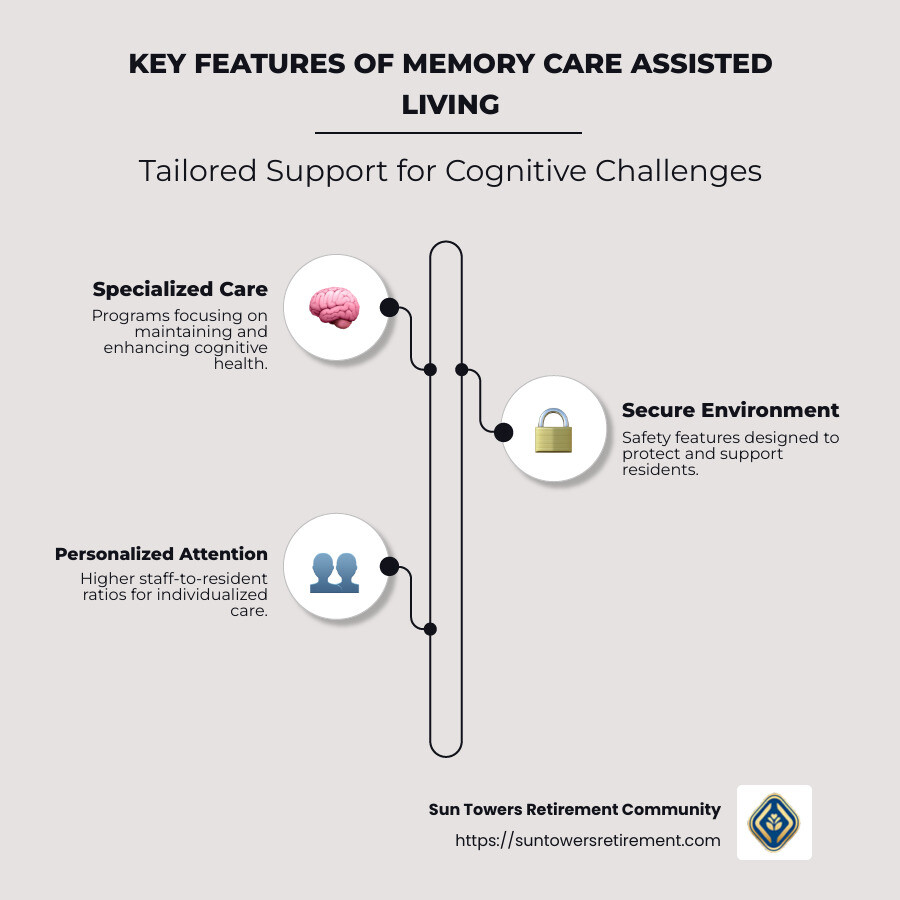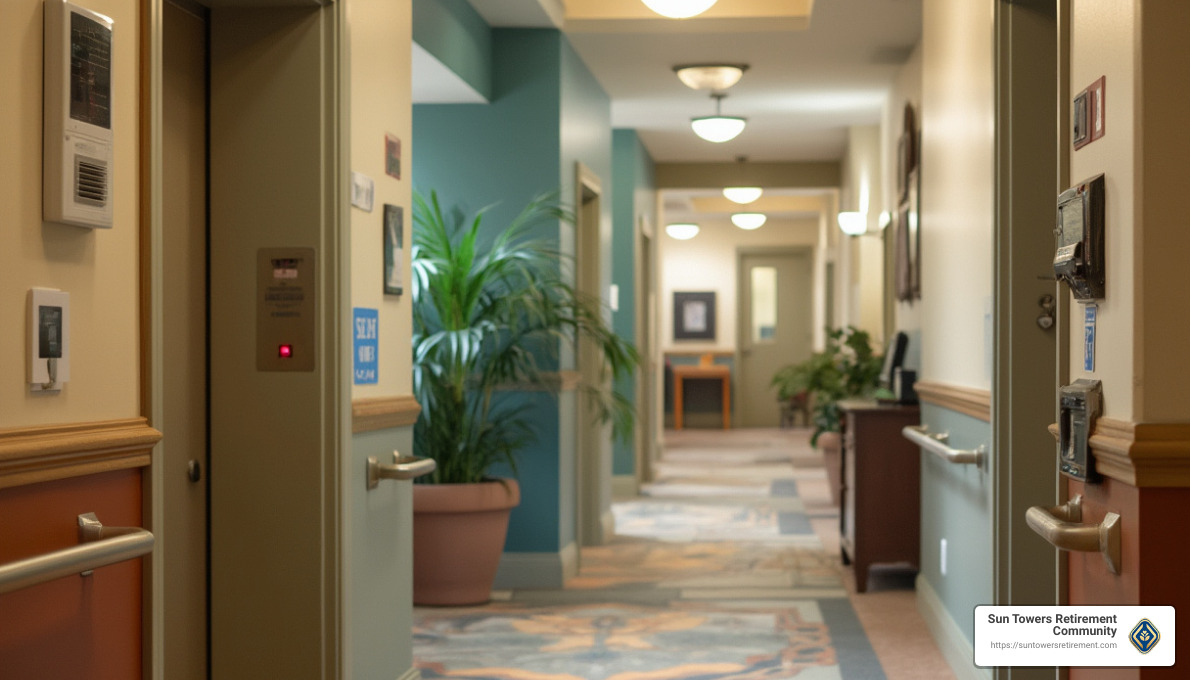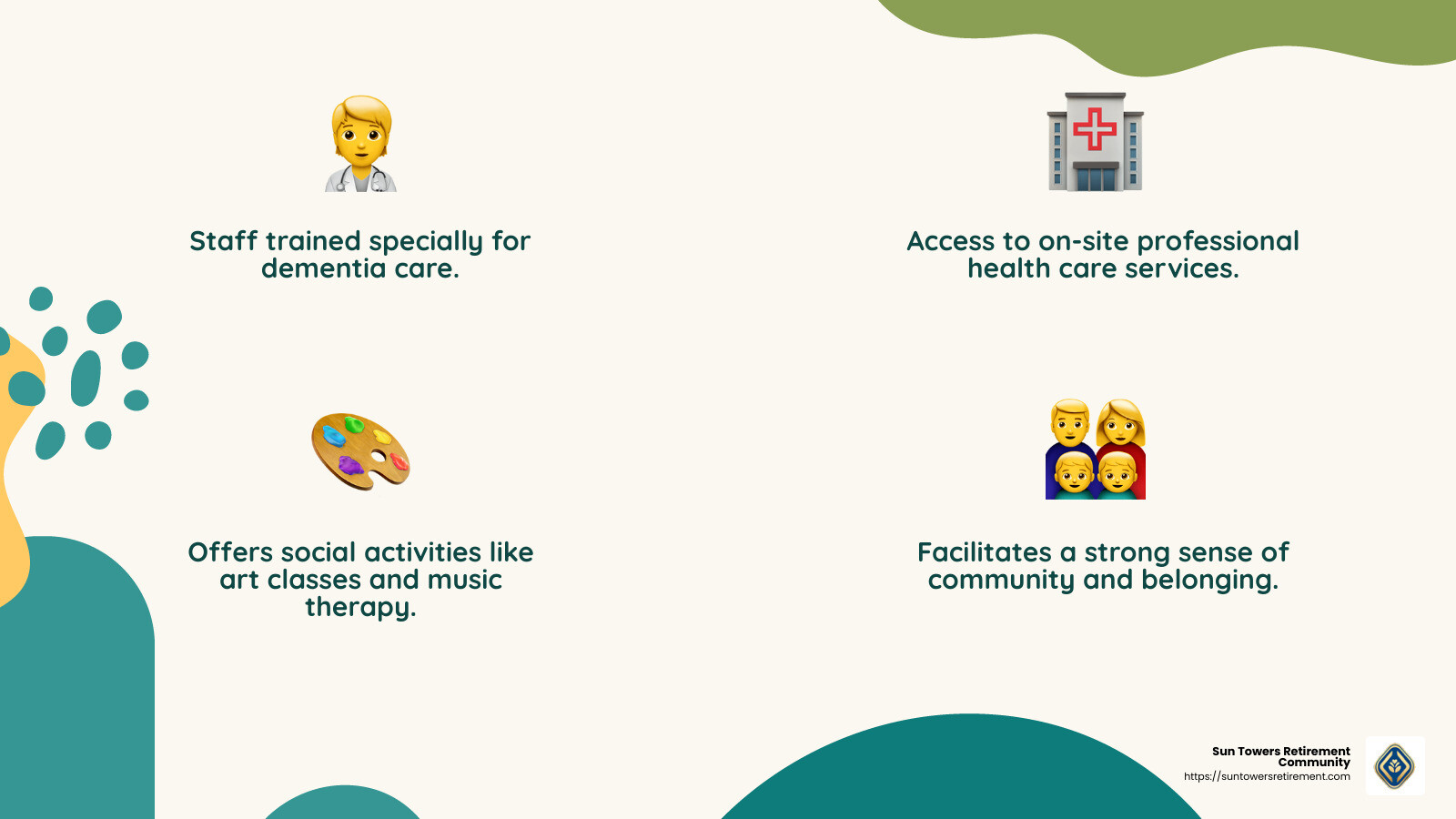Memory Care Assisted Living: Top 5 Benefits 2025
Memory care assisted living is an approach designed to meet the unique needs of individuals with memory impairments such as dementia. For families seeking support, memory care assisted living offers a comprehensive solution that combines specialized memory care within a comfortable assisted living setting.
Key Features:
– Specialized Care: Custom programs focusing on cognitive health.
– Secure Environment: Improved safety features to ensure resident well-being.
– Personalized Attention: Higher staff-to-resident ratios ensure personalized care and supervision.
Navigating aging and health challenges can be daunting, especially when memory decline becomes a concern. In combining the support of assisted living with the specialized focus of memory care, communities like those in Sun City Center, FL, offer a seamless and supportive experience. As Maureen Bradley notes, “it’s very common for people in assisted living communities to be in the early stages of dementia,” making this form of care pivotal.
Memory care assisted living provides not only the necessities of daily life but also a nurturing environment where residents can thrive despite cognitive challenges. It transforms what can be a difficult transition into a time of support and community.
Memory care assisted living terms to learn:
– memory care
– what services do memory care facilities provide
Understanding Memory Care Assisted Living
Memory care assisted living is a specialized form of care designed for individuals experiencing cognitive impairments, such as dementia or Alzheimer’s disease. This approach combines the best of both worlds: the daily support of assisted living with the targeted care needed for memory-related conditions.
Specialized Care
In memory care assisted living, residents receive personalized programs aimed at maintaining cognitive health. These programs often include therapies like music, art, and reminiscence therapy, which are specifically designed to engage and stimulate memory.
Staff at these facilities are specially trained in dementia care, ensuring they can address the unique challenges faced by residents with compassion and expertise. This training includes understanding how to manage behaviors like wandering or aggression, which are common in dementia patients.
Secure Environment
Safety is a top priority in memory care assisted living. Facilities are equipped with improved security features such as alarm systems, locked entrances, and coded elevators to prevent wandering and ensure residents remain safe.
Layouts are thoughtfully designed to minimize confusion and anxiety. For instance, color-coded hallways and memory boxes help residents feel more oriented and comfortable in their surroundings.
Cognitive Impairments
Cognitive impairments can make daily life challenging for individuals and their families. Memory care assisted living addresses these challenges by providing a structured and supportive environment. Residents benefit from 24-hour supervision and care, allowing them to maintain a sense of independence while having access to the help they need.
Activities and social interactions are custom to suit different stages of cognitive decline, ensuring that each resident can participate in a way that is meaningful and fulfilling.
By focusing on these key areas, memory care assisted living offers a comprehensive solution for those dealing with memory impairments, providing peace of mind for families and a dignified living experience for residents.
Key Differences Between Memory Care and Assisted Living
Memory care assisted living and traditional assisted living share some similarities, but they cater to different needs. Understanding these differences can help you choose the best option for your loved one.
Staff Training
In both settings, staff are trained to assist with daily activities and provide general care. However, memory care facilities require additional expertise. Staff members are specially trained to handle dementia-related behaviors, such as wandering or confusion. They know how to create a calming environment and engage residents with cognitive challenges.
Safety Measures
Safety is crucial in both types of facilities, but memory care takes it a step further. While assisted living communities might have basic security, memory care facilities feature improved measures. These include locked entrances, coded access systems, and alarmed exits to prevent wandering. Hallways might be color-coded, and memory boxes are often used to help residents feel at home.
Amenities
Amenities in assisted living cater to a broad range of seniors, offering options like exercise facilities, dining areas, and social spaces. Memory care facilities, on the other hand, are designed with cognitive impairments in mind. They often include sensory-friendly spaces and quiet areas to reduce overstimulation. These amenities help create a supportive environment for residents with memory loss.
Activities
Activities in assisted living are diverse and aim to engage a wide audience. Residents might enjoy book clubs, dance classes, or outings. In memory care, activities are more structured and focus on cognitive stimulation. Therapies such as music, art, and pet therapy are common. These activities are custom to help residents maintain cognitive function and provide a sense of accomplishment.
Cost
The cost of care is another key difference. Memory care tends to be more expensive due to the specialized services and higher staff-to-resident ratio required. While assisted living covers basic daily assistance, memory care includes additional support for cognitive challenges, which can impact pricing. It’s essential to consider both the level of care needed and the associated costs when making a decision.
By understanding these key differences, you can better assess which environment will provide the right support for your loved one. Whether the focus is on social activities, specialized care, or improved safety, each option offers distinct benefits custom to specific needs.
Benefits of Memory Care Assisted Living
Memory care assisted living offers a unique blend of personalized care, professional health services, and engaging social activities, all delivered by specialized staff. This approach ensures a supportive environment for individuals with cognitive impairments.
Personalized Care
In memory care assisted living, each resident receives individualized attention custom to their specific needs. This includes help with daily activities like bathing, dressing, and medication management. Staff members work closely with families to understand each resident’s preferences and routines, creating a care plan that feels familiar and comforting.
Professional Health Care
Residents have access to a range of professional health services, including physical therapy and psychiatric care. These services are crucial for managing both physical and mental health challenges. By having on-site healthcare professionals, memory care facilities ensure that residents receive timely and appropriate medical attention.
Social Activities
Social interaction is a key component of memory care assisted living. Activities are designed to engage residents and provide cognitive stimulation. Whether it’s music therapy, art classes, or group outings, these activities encourage socialization and help maintain mental sharpness. They also offer residents a sense of community and belonging, which is vital for emotional well-being.
Specialized Staff
The staff at memory care facilities are specially trained to support individuals with dementia and other cognitive impairments. They understand the unique challenges these residents face and are skilled in techniques to manage behaviors like confusion and wandering. This specialized training equips staff to create a safe, nurturing environment where residents can thrive.
By combining these elements, memory care assisted living provides a comprehensive support system that improves the quality of life for residents. This specialized approach ensures that each individual receives the care and attention they need to live comfortably and safely.
Next, we’ll explore when it might be time to consider memory care assisted living for your loved one.
When to Consider Memory Care Assisted Living
Deciding when to move a loved one into memory care assisted living can be challenging. However, there are clear signs that indicate it might be time to consider this option.
Safety Concerns
One of the main reasons families choose memory care is safety. If your loved one is prone to wandering, getting lost, or attempting unsafe activities like cooking on their own, it may be time to make the switch. Memory care facilities are designed with safety in mind, featuring secure entry and exit points, color-coded hallways, and 24-hour supervision. These features help prevent accidents and ensure residents can’t wander off.
Personal Care Tasks
As dementia progresses, everyday tasks become difficult. If your loved one struggles with personal care tasks like bathing, dressing, or using the bathroom, they may benefit from the personalized assistance available in memory care. Staff members are trained to help with these activities while maintaining the resident’s dignity and comfort.
Caregiver Needs
Caring for someone with dementia can be overwhelming. Family caregivers often experience stress and burnout. Memory care provides a supportive environment not just for residents, but also for their families. By entrusting professionals with your loved one’s care, you can focus on being a supportive family member without the constant strain of caregiving.
Memory care assisted living offers a safe and compassionate environment for those who need it most. By understanding the signs and needs of your loved one, you can make an informed decision that prioritizes their well-being and your peace of mind.
Next, we’ll address some frequently asked questions about memory care assisted living.
Frequently Asked Questions about Memory Care Assisted Living
How does memory care differ from assisted living?
Memory care assisted living provides a more secure and specialized setting compared to traditional assisted living. While both offer support with daily activities, memory care facilities are specifically designed for individuals with cognitive impairments such as dementia.
In memory care, the environment is custom to prevent wandering, a common behavior in dementia patients. Facilities often include alarmed doors and enclosed outdoor areas to ensure residents’ safety. Staff in memory care units receive specialized training to manage dementia-related behaviors like confusion and aggression, offering a higher staff-to-resident ratio for more personalized attention.
When should someone with dementia consider memory care?
Deciding when to transition to memory care can be difficult. However, there are clear indicators that it might be time.
If your loved one is experiencing advanced dementia symptoms, such as increased confusion or frequent disorientation, memory care might be necessary. Safety risks, like wandering or difficulty managing daily tasks even with assistance, are strong signals. Memory care provides a structured environment with 24-hour supervision, which can significantly improve the safety and quality of life for those with advanced dementia.
Does Medicare cover memory care assisted living?
Medicare coverage for memory care assisted living is limited. Generally, Medicare does not cover the cost of long-term residential care, including memory care. However, it may cover certain medical services provided within the facility, such as doctor visits or physical therapy.
For financial assistance, families can explore other options like Medicaid, which may cover memory care costs depending on eligibility. Additionally, long-term care insurance policies might offer some coverage for memory care services. It’s important to review these options and consult with a financial advisor to understand what assistance is available for your specific situation.
Conclusion
At Sun Towers Retirement Community, we are committed to providing a comprehensive continuum of care for our residents. Our community in Sun City Center, FL, offers a range of living options, including Independent Living, Assisted Living, Memory Care Assisted Living, and Skilled Nursing. This allows residents to “Age in Place,” meaning they can transition smoothly between levels of care as their needs change, all within the same supportive environment.
Our memory care assisted living services are designed to provide specialized support for individuals with cognitive impairments such as dementia. With a focus on personalized care and safety, we ensure that residents receive the attention and assistance they need while enjoying a fulfilling and enriching lifestyle. Our staff is specially trained to handle the unique challenges of memory care, creating a secure and compassionate environment for our residents.
By choosing Sun Towers, families can rest assured that their loved ones are in capable hands. Our community emphasizes the importance of maintaining social connections and participating in activities that improve quality of life. We believe that aging should be a dignified and positive experience, and we are dedicated to making that a reality for every resident.
For more information about our memory care services and how we can support your loved one’s journey, please visit our Memory Care Services page. We invite you to explore how our community can provide the perfect blend of care, comfort, and community.





















